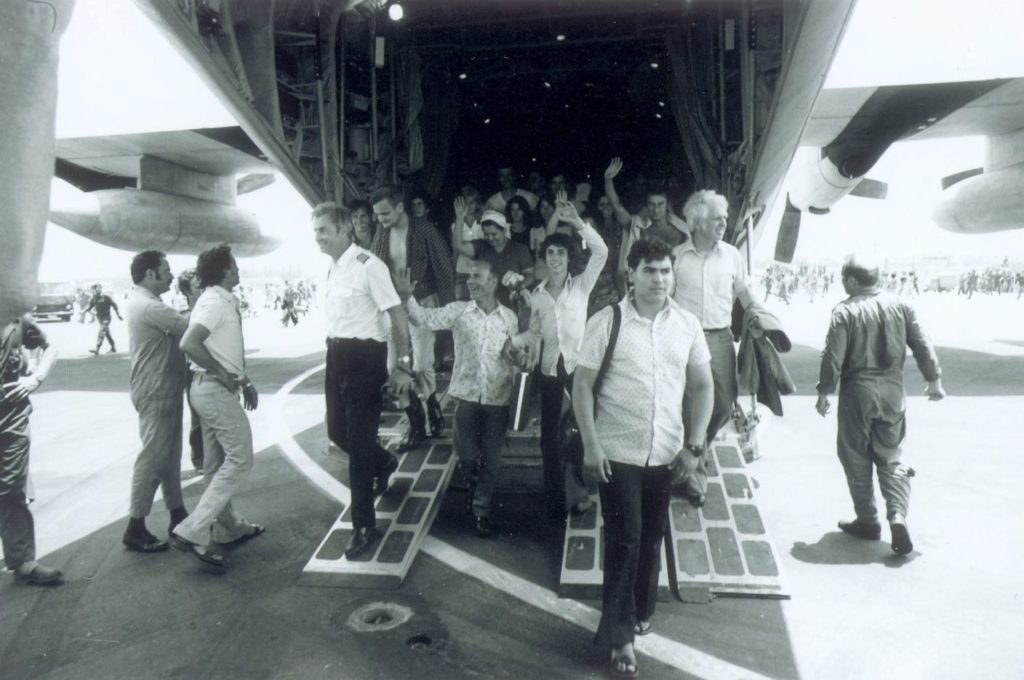
(wikipedia)
I consider myself fortunate each time I encounter one of those rare individuals whose thinking enables them to overcome seemingly impossible obstacles. One such person is the late Shimon Peres, former Defense Minister and later Prime Minister of Israel. In “No Room for Small Dreams” he writes about the imaginative, courageous thinking required to build and sustain this initially fragile nation. The chapter dealing with the hijacking of Air France Flight 139 on June 27, 1976 and the Israeli response contains some lessons for life I feel are well worth noting.
The hijacking by the Popular Front for the Liberation of Palestine presented the Israeli government with a quandary that understandably immobilized the thinking of its members. The plane, carrying more than 100 Israeli citizens, landed at the Entebbe Airport in Uganda. Idi Amin, the country’s ruthless, often erratic dictator welcomed the hijackers. They demanded the release of some 40 terrorists held by Israel.
The Jewish state had never negotiated with terrorists who had killed innocent civilians, but because Entebbe was 2000 miles from Israel, in an unfriendly state, there would be no easy solutions. They were given 36 hours to free the terrorists they held, or the Israeli passengers would be executed.
No country or army had ever undertaken a challenge of this dimension. The military leadership, including the Army Chief of Staff, considered rescue impossible. Prime Minister Yithzhak Rabin and most members of his cabinet felt they had no option but to negotiate. Defense Minister Shimon Peres alone argued against surrendering to the terrorists’ demands. “Terrorism is like a deadly disease,” he reminded them, “one that cannot be defeated by compromise or concession. To give in to the demands of terrorists is to give in to more and bigger demands in future hijackings.”
Reflecting the concerns of his cabinet and the military, Rabin countered with, “there are too many uncertainties, too many unknowns, too little intelligence, too many risks.” All the fears were well founded. They didn’t know the layout of the airport or where the hostages were being kept. Also, they didn’t know if Amin’s soldiers would support the hijackers.
Peres slept little during this time. He assembled his most creative people and formed what some referred to as his “Fantasy Council.” He refused to believe rescue was impossible and pushed them to use their imaginations and examine every idea, crazy as it seemed. He urged them to be bold in thinking about options that did not yet exist. Peres was convinced that “until one accepts that unlikely does not mean impossible, the chances of developing creative solutions are severely limited.”
The clock was steadily ticking toward the hijackers’ deadline and as yet there was no feasible plan. Even so, Peres refused to believe it couldn’t be done. In Cabinet meetings he stressed “if we give in to the terrorists’ demands, everyone will understand us, but no one will respect us. Israel will look like a rag, and even worse, she will be one.”
They did get a little help. Idi Amin left for an out of country conference, so the hijackers extended the deadline by 3 days. Also, the non-Israeli passengers were released and a former French army officer provided detailed drawings of the airport, the number of hijackers, and location of the hostages. Having this knowledge, the “Fantasy Council” created an innovative but daring and dangerous rescue plan. The Cabinet accepted it, “but not with a light heart”, as Rabin put it.
On the night of the rescue attempt, several Hercules aircraft departed for the Entebbe Airport. The first followed a British airliner down to the runway, thereby avoiding detection by airport radar. The doors opened and a black Mercedes with Ugandan flags descended the ramp. As hoped, the terrorists were deceived into thinking this was Idi Amin returning from his conference. Several other Hercules landed and Israeli commandos quickly engaged the hijackers in a fierce firefight, killing all. The hostages were instructed to enter one of the Hercules. Unfortunately one had already been executed in a hospital. Three, plus the commando leader, died in the cross fire. After 55 minutes, commandos and hostages were in the air, flying back to Israel.

In “No Room for Small Dreams”, Shimon Peres writes, “Daring thinking about one’s options is always the better option.” It’s a powerful approach to life we can all apply, a way of thinking that will raise our lives to a higher level.
